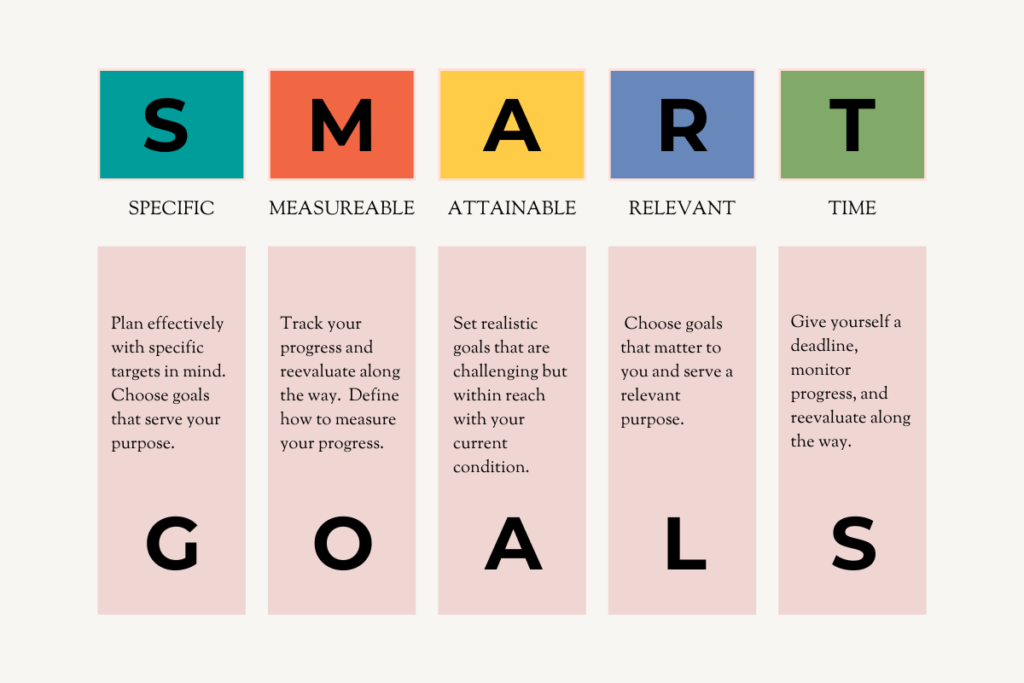Have you ever set a New Year’s resolution, only to find it abandoned by February? Or maybe you dream of that promotion, but the path seems overwhelming. If so, you’re not alone. We all have goals, but achieving them can feel like scaling Mount Everest in flip-flops. But fear not, fellow adventurers! There’s a powerful tool in your arsenal: SMART goals.
Ever since I started to set SMART goals for myself, my life has seen an outstanding improvement. Especially when I was working on my master thesis, these goals have helped me plan and achieve every milestone I set for myself, especially when working on my master’s thesis. I struggled many times with a full list of to-dos, abandoning it before even getting to do the second task.
Nowadays, distractions are everywhere and it’s easy to be set off your path of achieving a certain goal. But that’s not all. Constantly being interrupted when working on a task has been proven to lead to burnout faster than in other ways. Also, distractions (including multitasking) can lead to increased levels of stress in adult individuals.

But what are SMART Goals and why should you use them? Learn more below.
What are SMART goals?
Imagine a GPS for your dreams. SMART goals are like that, guiding you toward success with clear, actionable steps. They will also help you with increased clarity on your ideas, focus your efforts on certain areas that need them the most, and make sure you use your resources productively.
The SMART in SMART Goals stands for:
- Specific: Plan effectively with specific targets in mind. Instead of focusing on general areas to improve, such as health, school, work, and personal relationships, define your target in a specific manner. Don’t just say “Get healthy.” Aim for “run a 5K marathon in 6 months.”
- Measurable: Track your progress and reevaluate along the way. Tracking is the most important step in achieving these goals, mostly because it helps you focus on the path toward the end goal. Always know where you’re at. How many pounds will you lose? How many training runs will you complete?
- Attainable: Set realistic and challenging goals, but within reach. Running a marathon on week one might be a stretch, but running 0.5 miles a day might be achievable for most people. When I started practicing Barre, my first SMART goal was to reach my toes in a standing position. I achieved that in around 2 months. For others may seem like a small goal, but for me, it meant a lot taking into consideration where I started.
- Relevant: Choose goals that matter to you and serve a relevant purpose. Why do you want to run a 5K? Just because other people are doing that? That will not be enough. Without a purpose, there is no goal.
- Time-bound: Give yourself a deadline, monitor progress, and reevaluate along the way. When will you conquer that 5K finish line? Is there a competition going around in your city any time soon? You have to know the deadline beforehand in order to plan effectively.

Why use SMART goals?
Think of SMART goals as your personal roadmap to success. They provide:
- Clarity: No more fuzzy daydreams. You know exactly what you’re working towards.
- Focus: Prioritize effectively and avoid distractions.
- Motivation: Celebrate milestones and stay energized as you see progress.
- Accountability: Track your journey and adjust your course if needed.
How to define your own SMART goals?
SMART goal-setting is a technique that helps you transform broad aspirations into concrete actions. By implementing the following steps, you can divide your desired outcomes into smaller, more manageable steps, enabling you to monitor your progress and successfully achieve your goals. All you have to do is:
- Brainstorm: What do you want to achieve? Jot down anything that comes to mind. Focus on one type of goal at the time, such as health, finances, school, work, relationships, or more particular topics.
- Refine: Choose a goal that targets a specific behavior. Replace a negative behavior (or latent behavior) with a target behavior if you struggle to come up with ideas.
- Get specific: Flesh out your goal with details. Instead of aiming for vague goals like “improve my health” or “make more money,” break down your goals into specific, actionable steps. For instance, instead of “improve my health,” you could set a goal to “lose 10 pounds by the end of the year.”
- Make it measurable: Define how you’ll track progress. Establish clear metrics to track your progress towards your goals. For example, to track your progress in losing weight, you could measure your weight regularly or track your calorie intake.
- Set a deadline: Create a sense of urgency. Assign a specific date by which you aim to achieve your goal. This creates a sense of urgency and motivates you to take action. However, try to be realistic about your timeline. Don’t set unrealistic expectations that could lead to discouragement and hinder your progress.
Successful Formula for SMART Goals:
Use the SMART goal formula! Simply fill in the blanks:
I will [Specific action] [Measurable outcome] by [Date] because [Relevant reason].
For example: “I will save $50 each week for 6 months to pay off my credit card debt and start saving for a vacation afterward”
Remember, SMART goals are a journey, not a destination. Celebrate small wins, adjust your course if needed, and most importantly, have fun! With SMART goals as your compass, you’ll reach your peak and conquer any mountain – or start saving for a vacation- that comes your way.

So, what are you waiting for? Start crafting your SMART goals today and watch your dreams take flight!
P.S. Don’t forget to reward yourself for achieving your goals! Going on a trip with your friends or family sounds pretty darn SMART to me.
I hope this blog post inspires you to set and achieve your goals! Remember, with a little planning and SMART thinking, anything is possible. So go forth and conquer your dreams!
Read More:
How to Be More Productive: 5 Tips to Increase Productivity
7 Ways To Build Self-Discipline That Lasts Forever





